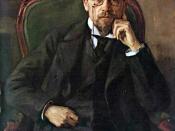The time period during which Anton Chekhov's The Lady with the Pet Dog (Meyer, Michael. The Compact Bedford Introduction to Literature, 165-176.) was written sets the tone for the story. Once we are aware that Chekhov was writing near the end of the Victorian era, we are propelled into the past, to a time when societal rules concerning marriage and commitment were drastically different than they are in our modern society.
Immediately, we learn that Gurov was an unwilling participant in an arranged marriage. "They had found a wife for him when he was very young"� (166), and he was "afraid of her and did not like to be at home"� (166). His unhappiness with his marriage translates into his infidelity and his dislike of women in general, going so far as to call them "the inferior race"� (166). While reading a more contemporary story, we might find ourselves feeling anger toward Gurov for what we would perceive as a lack of commitment, yet when we consider the time period of the story, we see that Gurov's actions are a reaction to the world in which he lives.
He cannot escape his marriage easily, for to do so would be to neglect his responsibility as the head of the household or to rebel against society's mores. Instead, he leads a secret life and truly believes that everyone else does, as well, which is indicated by his viewpoint that "The personal life of every individual is based on secrecy"� (175).
His love affair with Anna develops quickly, moving from a chance encounter in the small resort town of Yalta, where they are both on vacation from their spouses, to a full-blown love affair. Gurov's emotions are not clear at first and it seems as though he is merely satisfying sexual hunger,


